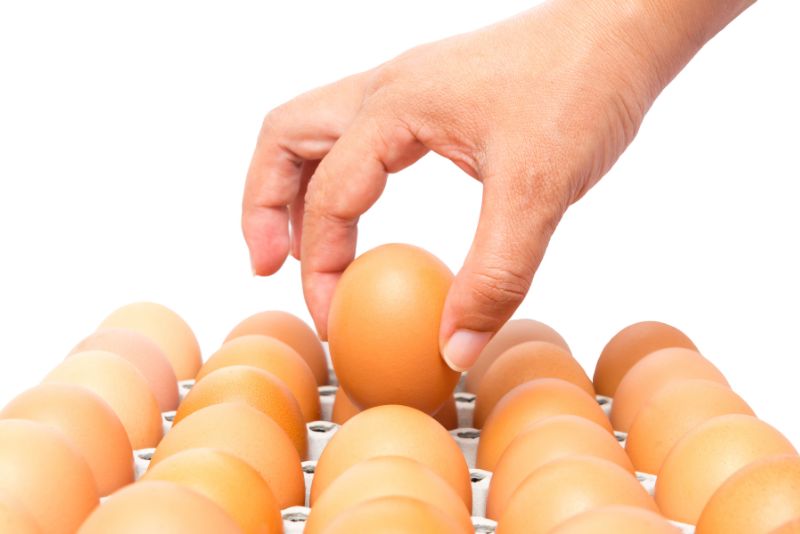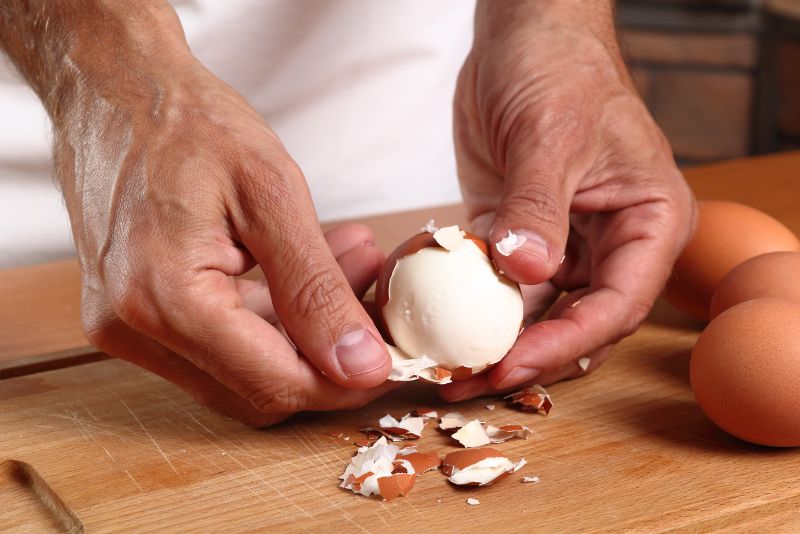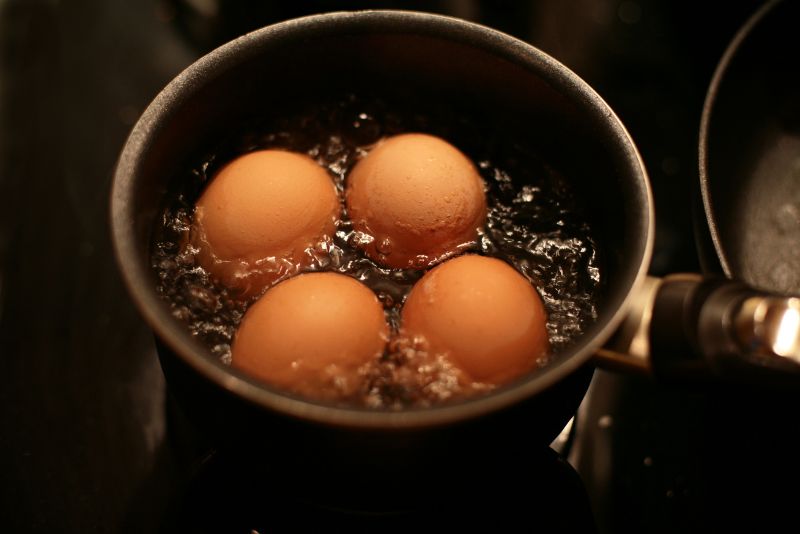Have you ever encountered your boiled eggs floating in the water?
For someone, who has experienced it for the first time, it may spark questions about the safety and edibility of floating eggs.
In this article, I’ll delve into the mystery behind floating eggs, debunk common myths, explore the factors that contribute to this occurrence, and answer the question: can you eat boiled eggs that float?
Table of Contents
Can You Eat Boiled Eggs That Float?
Yes, you can eat boiled eggs that float. Floating eggs are usually older than fresh eggs, but they are still safe to consume.
The reason why some eggs float is that the air cell inside them has enlarged, making them buoyant in water.
Why Do Boiled Eggs Float in The Water?
When boiled eggs float in water, it usually means that the egg is older and not fresh.
This happens because as an egg age, air enters the shell through its pores. This air pocket makes the egg less dense than water, causing it to float.
The age of a boiled egg can be determined by placing it in a bowl of cold water. If the egg sinks to the bottom, it is fresh.
It’s important to note that even though an egg may float in water, it may still be safe to consume.
To check for safety, crack open the egg and inspect its color and smell before eating or cooking with it.
If there are any signs of spoilage, such as discoloration or a bad odor, then discard the egg immediately.
There are three main reasons why a boiled egg may float in the water:
- Age: Older eggs are more likely to have larger air cells, making them more buoyant.
- Shell Porosity: Eggs with more porous shells may lose moisture faster, resulting in larger air cells.
- Storage Conditions: Eggs stored at room temperature may age more rapidly, leading to larger air cells.
Tip: Suppose you’re making a meatloaf and find out that you’re out of eggs, try these egg substitutes.
Debunking Boiled Eggs Myths
Myth: Floating eggs are rotten eggs.
Contrary to popular belief, the floating of an egg does not automatically indicate spoilage or rot. To determine the freshness of an egg, factors such as odor and appearance should be considered.
Myth: Only hard-boiled eggs float.
Both raw and cooked eggs can float, depending on their age and the size of the air cell. The boiling process does not affect an egg’s tendency to float.
How To Tell If An Egg Is Bad?
The best way to tell if an egg is bad is to trust your senses. If it looks or smells different than usual, it may be bad.
You can also perform the float test:
- Fill a bowl with cold water and gently place the egg inside.
- If the egg sinks, it is fresh; if it tilts upwards or even floats, it is old.
Another method is to crack the egg open into a bowl and check for any discoloration in the yolk or white – this could be a sign of mold or bacterial growth.
Lastly, you can hold the egg to your ear and shake it – if you hear sloshing around, that’s a bad sign.
How To Choose the Best Eggs for Boiling

When it comes to finding good eggs for cooking/eating, there are 5 things you must consider:
Freshness
Choose eggs that are relatively fresh. Fresh eggs have firmer whites and yolks, making them easier to handle and less likely to crack during the boiling process.
Size
Consider the size of the eggs you prefer. While size doesn’t directly affect the boiling process, it can impact cooking times.
Larger eggs may require slightly longer boiling times to achieve the desired doneness.
Shell integrity
Inspect the eggshells for any cracks or damage. Cracks can lead to leakage during boiling and result in unevenly cooked eggs.
Select eggs with intact shells to ensure even cooking and prevent any potential contamination.
Storage conditions
Opt for eggs that have been stored properly. Eggs stored in the refrigerator tend to have a longer shelf life and maintain their freshness compared to those kept at room temperature.
Source
Consider the source of the eggs. If possible, choose eggs from trusted suppliers or local farms that prioritize egg quality and freshness.
By taking these factors into account, you can select the best eggs for boiling and ensure a satisfying result when preparing your favorite boiled egg dishes.
Are Hard Boiled Eggs Suitable for Freezing?
If you have a surplus of hard-boiled eggs and are wondering if you can freeze them for later use.
Yes, you can freeze hard-boiled eggs. Freezing hard-boiled eggs is a convenient way to extend their shelf life and have them readily available for future meals or snacks.
However, there are a few important considerations to keep in mind:
Remove shell

It is best to remove the shells before freezing hard-boiled eggs. The shells can become rubbery and difficult to peel after freezing and thawing.
Simply peel the eggs carefully, ensuring no shell fragments remain.
Use a paper towel
Hard-boiled eggs have a high moisture content, which can lead to texture changes when frozen. To minimize this, pat the eggs dry with a paper towel before freezing.
Freezer-safe container
Place the peeled and dried hard-boiled eggs in a freezer-safe container or resealable plastic bag. Make sure to label and date the container for easy identification later.
Use within 3 months
Hard-boiled eggs can be safely stored in the freezer for up to three months. Beyond that, they may start to develop a grainy texture and lose some of their flavor.
Thawing
When you’re ready to use the frozen hard-boiled eggs, transfer them to the refrigerator to thaw overnight.
Thawed hard-boiled eggs should be consumed within 24 hours for the best quality and taste.
It’s worth noting that while frozen hard-boiled eggs are safe to eat, their texture may change slightly after freezing.
The yolks can become slightly crumbly, but they are still perfectly suitable for salads, sandwiches, or as a quick snack.
Frequently Asked Questions
1. Are boiled eggs supposed to float?
No, boiled eggs are not supposed to float. The floating of boiled eggs indicates that they are no longer fresh.
2. Can you still eat floating-boiled eggs?
While it is possible to eat floating boiled eggs, it is advisable to use them for cooking purposes rather than consuming them as is. The quality and taste of the egg may be compromised due to the aging process.
3. Are there any health risks associated with consuming floating-boiled eggs?
Consuming floating boiled eggs does not pose significant health risks. However, it is important to ensure that the eggs are properly cooked before consumption to minimize the risk of foodborne illnesses.
4. Can you use floating boiled eggs for making deviled eggs or egg salad?
Yes, you can use floating boiled eggs for making deviled eggs or egg salad. As long as the eggs are cooked properly and do not exhibit any signs of spoilage, they can be used in various recipes that call for boiled eggs.
